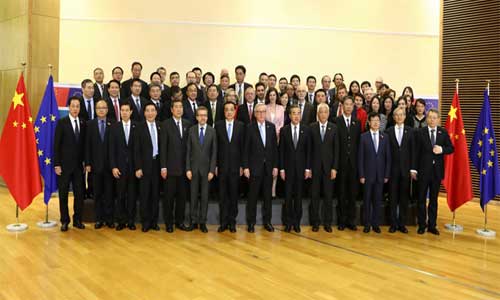Over the past half century, there has been a sound basis for development between China and Europe, with mutual political trust, economic complementarity, and cultural exchanges. It can be said that both China and Europe are at a critical historical stage of development, it is more urgent than ever for both sides to enhance strategic mutual trust, deepen pragmatic cooperation and enhance role-playing in global governance.
Looking back on the historical development of China-EU relations in the past from 1975 till now, we can say that it has experienced several stages. Up to now, there are not so many policy documents issued by China and Europe for each other. There are seven documents issued by Europe to China and three documents issued by China to Europe. There are many factors of change in China-EU relations, such as the strength contrast between the two sides, policy changes and changes in the country’s internal and external strategic environment. China and Europe’s understanding of each other is also constantly adjusting and changing. China-EU relations have increasingly shown the characteristic of stability.
After China put forward the “Belt and Road Initiative”, the European side also announced the “Eurasian Interconnection Strategy” document. Both sides attached importance to promoting interoperability. They agreed to promote the “BRI” and the EU initiative, and vigorously carry out the third party cooperation. While realizing the “hard link” of infrastructure, we should strengthen the “soft link” of systems, rules and standards. But there are still frictions and conflicts, mainly in the following aspects: First, there is insufficient political mutual trust and differences in ideas. China and Europe are opposed in political system and ideology, they have disputes over Tibet, Xinjiang, human rights, arms sales and Taiwan. They have also increased their criticism of freedom of religious belief. In addition, European countries also engage in “balanced diplomacy” in the East China Sea and South China Sea issues. Some Western European powers believe that the “16 + 1” cooperation framework is China’s “divide and rule” over Europe, and that it will weaken the EU’s external leadership. On March 12th, 2019, the European Commission and the EU High Representative for Foreign and Security Policy drafted a 16 page EU-China Strategic Prospects document .This report shows the EU’s fear of so-called “Chinese competition”. Second, the economy is wary of constantly suppressing China. China-EU economic and trade relations are asymmetrical. The main problem is the trade deficit between China and Europe. Up to now, the principles and mechanisms for properly resolving trade disputes between China and Europe have not been reached.
China’s and Europe’s national conditions, regional and global changes require both sides to look at each other with a new strategic perspective. In the future, China-EU relations should be strengthened mainly in the following areas. First, deepen strategic mutual trust and do a good job of political leadership. We will continue to maintain high-level bilateral exchanges, hold annual Leaders’ meetings. In view of the major global issues, the two sides should comprehensively implement the Strategic Plan for China-EU Cooperation 2020. We will better complete the in-depth docking between China’s 13th Five-Year Plan and the European 2020 Strategy, and strive to achieve the effective integration of the two sides’ medium-and long-term development strategies. Second, we should focus on the new changes in the strategic environment of China and Europe. It involves not only the relations between the EU and Russia, but also between Europe and the United States. Tensions between Europe and the United States and changes in EU-Russia relations will greatly increase opportunities for EU and China in various aspects, such as global climate governance, safeguarding the multilateral trading system and maintaining the role of the United Nations. China and the EU should abandon zero-sum thinking, eliminate the impact of adverse factors. Third, we should serve China-EU pragmatic cooperation in various fields and promote interconnection between the two sides. The OECD, G20 and China’s “BRI” have brought new perspectives of cooperation for the development. Recently, the Italy and the Chinese government also mentioned the strengthening of the“BRI”and the docking of Italy’s “northern port construction” and “investment Italy plan”.
China-EU relations are in the new period of historical development, and both sides should cherish the opportunities for cooperation. The common interests and willingness of China-EU cooperation are increasing. China also hopes that more European countries will recognize the great potential of the“BRI” in promoting China EU interconnection and cooperation, conform to the trend of the times, seize the opportunities of common development, and contribute to building the community of human destiny.
Home » Opinion » China-EU Relationship in New Period
China-EU Relationship in New Period
| You Nan

